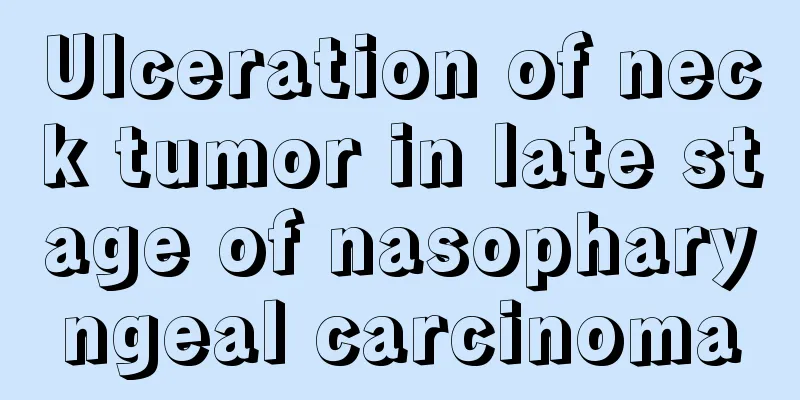Ulceration of neck tumor in late stage of nasopharyngeal carcinoma

|
Ulceration of the neck tumor in the late stage of nasopharyngeal carcinoma is a serious manifestation of disease progression and requires immediate medical attention. Treatment methods include radiotherapy, chemotherapy and surgery, combined with nutritional support and psychological counseling. 1. Causes of ulceration of neck tumor in late stage of nasopharyngeal carcinoma In the late stage of nasopharyngeal carcinoma, neck tumor ulceration is usually caused by the continued growth of the tumor and invasion of surrounding tissues, leading to local blood circulation disorders and tissue necrosis. Nasopharyngeal carcinoma itself is closely related to Epstein-Barr virus infection, genetic susceptibility, and environmental factors such as smoking, drinking, and eating pickled foods. In the late stage, the tumor increases in size, compressing or eroding blood vessels and skin, causing ulceration and infection. 2. Treatment methods 1. Radiotherapy: Radiotherapy is the main treatment for nasopharyngeal carcinoma, especially for patients in the advanced stage. Precision radiotherapy can reduce the size of the tumor, relieve symptoms, and control further deterioration of the ulcerated area. 2. Chemotherapy: Chemotherapy drugs such as cisplatin and paclitaxel can inhibit tumor growth, reduce pain and infection risk. Chemotherapy is often used in combination with radiotherapy to improve efficacy. 3 Surgery: For patients with severe local ulceration and poor radiotherapy response, surgical removal of necrotic tissue can be considered to relieve symptoms and improve quality of life. 3. Nutritional support and care Patients with advanced nasopharyngeal carcinoma are often accompanied by malnutrition and need to strengthen dietary conditioning. It is recommended to choose high-protein, high-calorie, easily digestible foods, such as eggs, fish, tofu, etc. If necessary, energy can be supplemented through nasogastric feeding or intravenous nutrition. The ulcerated area needs to be cleaned and disinfected regularly, antibiotic ointment should be used to prevent infection, and the area should be kept dry and hygienic. 4. Psychological counseling and support Advanced cancer patients are prone to psychological problems such as anxiety and depression, so their family members and medical staff should provide adequate psychological support. Through psychological counseling, group activities and other means, patients can be helped to relieve their emotions and enhance their confidence in treatment. Late-stage nasopharyngeal carcinoma with ulcerated neck tumors requires comprehensive treatment, with radiotherapy, chemotherapy and surgery as the main means, while also focusing on nutritional support and psychological counseling. Patients and their families should actively cooperate with doctors in treatment, have regular follow-up examinations, and adjust treatment plans in a timely manner to improve their quality of life. |
<<: What causes nasopharyngeal cancer
>>: What are the symptoms of renal hamartoma?
Recommend
What foods can’t be eaten when you have liver cancer? What foods are good to eat in the late stage of liver cancer?
In today's society, there are more and more c...
Which hospital is good for skin cancer?
Skin cancer is a skin disease that is caused by l...
What is the reason for the hard bumps on the finger joints
The finger joints are the connecting points betwe...
What is the shelf life of salted duck eggs
Eating duck eggs is a very traditional food custo...
How to clean blood stains on clothes
Sometimes when we are injured or have a nosebleed...
What happens if a tumor ruptures
Tumor is a common physical disease in people'...
Will renal hamartoma cause back pain? The typical symptoms of renal hamartoma will tell you
Renal hamartoma is a benign tumor. The lesions oc...
What to do if soybean paste has maggots
Many people know that people in Northeast China l...
What is the best thing to wear when hiking in winter
Now there are many mountaineering enthusiasts aro...
How many grams of Patchouli should be used
Huoxiang Zhengqi Water often appears in TV commer...
Does acupuncture have side effects? You will regret it if you don’t read it
Usually we see the benefits of acupuncture, and m...
The TOP 10 afternoon teas you can’t miss
Afternoon tea "originated" in China? Yo...
Symptoms of heterosexual phobia
Some people have been living in an environment fo...
Are the embryo bud and fetal heartbeat present at the same time?
People often discuss the embryonic bud and fetal ...
What are the side effects of rabies vaccine
We all have a fear of rabies. Once the disease br...









